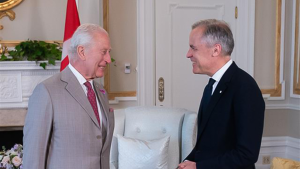Leadership should not be an experience in isolation, retired Major-General Lewis MacKenzie recently told construction industry leaders. MacKenzie is considered an expert on conflict resolution for his role in ending the siege of the Sarajevo during the Bosnian Civil War.
CanaData
Leadership should not be an experience in isolation, one of Canada’s most celebrated peacekeepers told construction industry leaders.
“When I decided to listen, I discovered a whole whack of people who were much smarter than me,” said retired Major-General Lewis MacKenzie.
“The trick to listening is to hear people talk to you.”
MacKenzie is considered an expert on conflict resolution for his role in ending the siege of the Sarajevo during the Bosnian Civil War.
With a multinational contingent of troops and under fire from both civil war combatants, MacKenzie gained control of Sarajevo airport through diplomatic means.
He also managed to bring global attention to the humanitarian crisis there.
MacKenzie now speaks about leadership and his past peacekeeping experiences in support of ICROSS (International Community for the Relief of Starvation and Suffering). He brought his presentation to the recent CanaData Construction Industry Forecasts Conference.
As he painted a detailed picture of the challenges and frustrations during his peacekeeping mission, he wove in leadership advice for conference attendees.
“An important thing is to be yourself. I have worked for 23 bosses and 19 of them were exceptional,” recalled MacKenzie. “People have to remember the perques are not for them but for the position they have.”
As MacKenzie moved up the command chain, he said he was often asked how lonely it is at the top. He said he never was lonely since, at times, he was responsible for 14,000 troops he considered his peers. MacKenzie reminded construction leaders that to have a “peer group” they must “interact” with others, which is the approach he applied during his military career.
“I believe in leadership by wandering about,” added MacKenzie. “If you only know one thing about the people around you, know their passion.”
Leaders are sometimes faced with ethical decisions and dilemmas which most often creep up when they are alone. MacKenzie said how he approaches such situation is to picture someone he loves, standing behind him, watching over his shoulder, as he works at the situation.
He joked if your loved one happens to be a criminal, “that’s another matter.”
Accepting responsibility even when you are not responsible and being up front is the best approach. MacKenzie said as soon as you start “digging that hole” that is when problems begin, from the battlefield to the boardroom.
Effective leadership also includes being “an actor,” said MacKenzie. Leaders of teams both big and small need to act on their “bad days” as if it were a “good day.” This consistency helps in approachability.
Leadership also means you must lead.
“The greatest threat to leadership is complacency,” said MacKenzie.











Recent Comments
comments for this post are closed